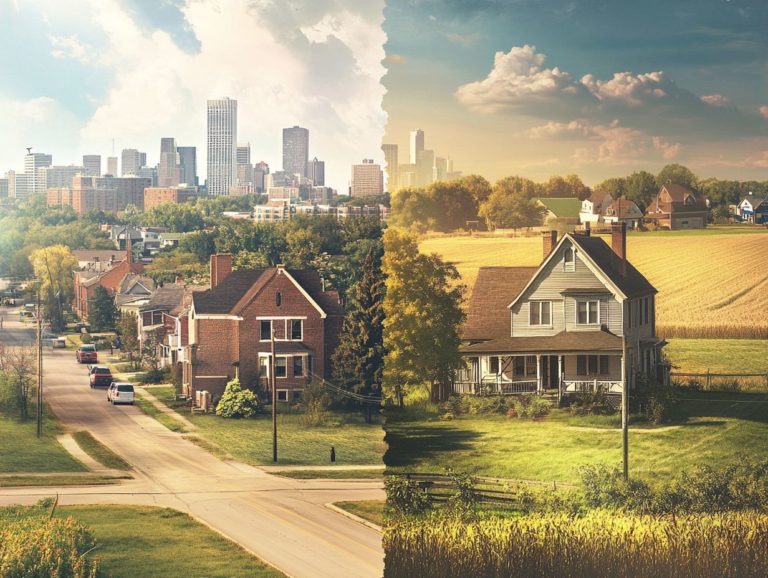Home Insurance Providers: Private vs. Public Options
When it comes to safeguarding your home, grasping the nuances of various insurance providers is essential.
This article delves into the differences between private and public home insurance options, highlighting their distinct coverage benefits and associated costs. It navigates you through the intricacies of each type, empowering you to make informed decisions tailored to your individual needs.
By the end, you’ll be well-equipped to compare quotes and policies with confidence, ensuring that your home is protected with the most suitable coverage.
Contents
- Key Takeaways:
- Understanding Home Insurance Providers
- Private Home Insurance Providers
- Public Home Insurance Providers
- Choosing the Right Home Insurance Provider
- Factors to Consider
- Comparing Quotes and Policies
- Frequently Asked Questions
- What are the main differences between private and public home insurance providers?
- What are the advantages of choosing a private home insurance provider?
- How do public home insurance providers differ from private ones in terms of cost?
- Do private and public home insurance providers have different claims processes?
- Which type of home insurance provider is better for unique or high-risk properties?
- Are there any government regulations that affect private and public home insurance providers differently?
Key Takeaways:
- Private home insurance offers a wider range of coverage but at higher costs.
- Public home insurance is often more affordable but may have limited benefits.
- When choosing a home insurance provider, consider factors like coverage needs and budget, and compare quotes from both private and public options.

Understanding Home Insurance Providers
Understanding home insurance providers is crucial for homeowners in Florida, especially those with homes in coastal areas at risk of natural disasters like hurricanes.
Homeowners insurance includes a range of policies designed to protect both your primary residence and any second homes you may own. It s important to ensure you have adequate coverage that caters to your unique requirements as you understand the changing insurance market.
Private vs. Public Options
When selecting home insurance, you ll often find yourself weighing the options between private insurance companies and public insurance providers. Each brings its own distinct advantages and coverage options tailored to various risk factors relevant to life in Florida.
Understanding these differences is vital, especially in a state that frequently faces hurricanes and other natural disasters. Private insurers usually offer a wider range of coverage limits, allowing you to customize your policy to fit your unique needs. You can even snag personalized discounts based on your claims history and any improvements you ve made to your home.
Public options like Citizens Property Insurance serve as a safety net for those who might be deemed uninsurable by private companies due to their location or specific high-risk factors. While premiums for public insurance can occasionally be lower, keep in mind that they often come with stricter limitations on policy terms and coverage.
Given the pros and cons of each option, it s essential to carefully assess your specific requirements before making a decision.
Private Home Insurance Providers
Private home insurance providers present a diverse array of homeowners insurance options tailored to meet your specific needs.
This allows you to enjoy personalized coverage that can effortlessly adapt to fluctuations in property value and the unique risk factors associated with coastal properties in Florida.
Coverage Options and Benefits

Private homeowners insurance provides various coverage options, including personal property protection, liability coverage (which protects against legal claims if someone gets hurt on your property), and tailored endorsements that meet your specific needs, ensuring you have adequate financial protection against potential property damage or loss.
These options enable you to customize your policy to safeguard what matters most, taking into account your unique living situation and valuable possessions. By bundling different types of insurance like combining your home and auto coverage you can unlock significant discounts, presenting an opportunity for remarkable savings while maximizing your protection.
It s wise for homeowners to regularly review and adjust their policies to reflect any changes in their circumstances, ensuring that their coverage remains relevant and effective over time.
Ultimately, grasping these aspects will enable you to make informed decisions that align perfectly with your individual requirements. Don t hesitate to get quotes or consult with insurance experts to secure your home immediately!
Costs and Factors to Consider
Understanding the costs associated with private home insurance is vital for you as a homeowner. Premiums and deductibles can fluctuate significantly based on various factors, including your claims history and risk factors.
Pay close attention to the unique characteristics of your property and your previous claims record. These elements greatly influence the premiums you’ll face. A history of frequent claims may lead insurers to view you as a higher risk, which can drive rates up.
Factors like your property’s location, age, and condition also play a crucial role in assessing potential vulnerabilities. By carefully evaluating these nuances, you can make informed decisions.
This approach can lower your costs and ensure you get suitable coverage.
Public Home Insurance Providers
Public home insurance providers, like the Citizens Property Insurance Corporation and the Florida Windstorm Underwriting Association, serve as vital options for homeowners in regions vulnerable to natural disasters. These entities offer coverage alternatives that are often more accessible and affordable than what private insurance companies provide.
Coverage Options and Benefits
Public homeowners insurance options present essential features that safeguard you against property damage. They provide medical payments, a critical lifeline for homeowners in vulnerable areas of Florida.
These policies often include provisions for natural disasters, such as hurricanes and floods, particularly relevant to your region. They can also cover extra living expenses if you need temporary relocation due to significant damages.
While public insurance may have limitations like reduced payout caps or longer waiting periods the comprehensive support it offers serves as a vital safety net. This is especially beneficial for those who find private insurance unaffordable or inaccessible, ensuring every homeowner has a fighting chance to rebuild and recover from unexpected events.
Choosing the Right Home Insurance Provider
Selecting the ideal home insurance provider demands thoughtful evaluation of several key factors. Consider coverage options, costs, service quality, and the expertise of the insurance agents.
This meticulous approach ensures that you make informed decisions tailored to your unique needs and risk profile.
Factors to Consider
- Coverage options that align with your unique needs.
- Claims history of potential providers.
- Potential risk factors, such as geographical vulnerabilities or the age of your property.
- Premium costs associated with different policies.
Understanding the nuances of each aspect enables you to make informed decisions. Exploring comprehensive coverage options ensures your property s specific needs are met.
By comparing premium costs, you can uncover hidden savings, helping you protect your investments while managing your budget wisely. This ultimately ensures peace of mind for the long haul.

When evaluating public home insurance providers, understanding the costs like premiums, deductibles, and coverage limits is crucial. These elements can significantly affect both affordability and the level of financial protection you receive.
Insurance assessments play a pivotal role in shaping your overall expenses. These assessments evaluate unique risk factors that public providers contend with, such as natural disasters and regional crime rates. Insurers weigh these variables because they can influence the likelihood of claims, impacting your premiums.
Public home insurance often includes community risk assessments, further refining the coverage and pricing structure. Having a comprehensive understanding of these dynamics enables you to choose a policy that aligns perfectly with both your budget and your coverage needs.
Comparing Quotes and Policies
Comparing insurance quotes and policies is essential for choosing the right homeowners insurance provider. You can easily compare coverage limits, premiums, and benefits.
This process can feel overwhelming due to the many unique offerings from different providers. Engaging with insurance agents can make this comparison much simpler.
They understand the details of various policies, including important aspects like deductibles (the amount you pay before insurance kicks in) and exclusions. Their insights into each insurer’s reputation can help you make informed choices that fit your financial goals.
Frequently Asked Questions

What are the main differences between private and public home insurance providers?
Private home insurance providers are privately owned companies offering coverage to individuals, while public home insurance providers are government-run entities providing coverage to the general public. For a deeper understanding of your options, check out home insurance providers and coverage options.
What are the advantages of choosing a private home insurance provider?
Private providers often offer a wider range of coverage options and discounts, along with personalized customer service. They can adjust premiums based on individual risk factors.
How do public home insurance providers differ from private ones in terms of cost?
Public providers may have lower premiums because of government backing. However, they might offer limited coverage options compared to private providers.
Do private and public home insurance providers have different claims processes?
Yes, the claims processes differ. Private providers often have a more efficient process, while public providers may face stricter regulations and longer wait times.
Which type of home insurance provider is better for unique or high-risk properties?
Private providers are usually better suited for unique or high-risk properties, offering customized coverage plans. Public providers may have stricter guidelines.
Are there any government regulations that affect private and public home insurance providers differently?
Yes, regulations can differ. Public providers may face more oversight, while private providers have more freedom in pricing and coverage options.
Start your comparison today and find the best home insurance for you!






